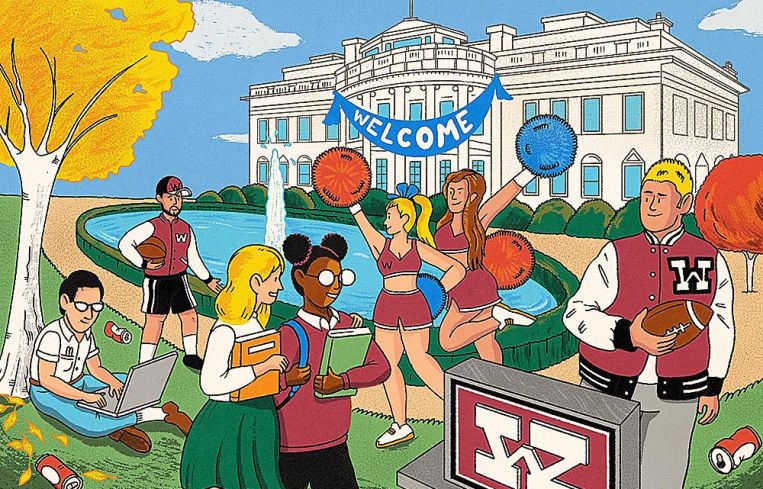DC as College Town USA: More Schools Than Ever Clamor for Space
At least six institutions of higher learning are looking to lease or buy right now, joining such schools as Texas A&M, NYU, USC and Johns Hopkins
By David M. Levitt August 15, 2023 6:00 am
reprints
One thing you can say for 1771 N Street NW, it will look good in a college catalog.
The 60,000-square-foot building, in Washington, D.C.’s tony Dupont Circle neighborhood, features a swooping curved glass façade that HOK Architects designed. The University of Southern California, an anchor institution in its hometown of Los Angeles, paid Stream Realty Partners $49.4 million for 1771 N Street NW in March, and intends to make it its East Coast hub for teaching, research, alumni events and government relations. USC is calling the building its “Capital Campus.”
“Last year our president expressed a desire for a bigger presence in Washington, D.C.,” said Brian Wilson, executive director of real estate development and leasing for USC. “(It gives us) more visibility, having more activity and enhanced educational opportunity for our students. Some of the most innovative universities in America have a presence in Washington, D.C., and we feel that we should be a part of that.”
Already, the building is hosting some classes, conferences and meetings, Wilson said. The plan is to fully occupy the building sometime next year. Its grand opening ceremony in April featured USC’s near-legendary Trojan Marching Band, which famously played on Fleetwood Mac’s 1979 album “Tusk.”
USC is only one example of how higher education is growing more intent by the day on having and keeping extensions of its reach in the nation’s capital. According to global real estate services firm CBRE (CBRE), there are now 32 satellite campuses there totaling some 800,000 square feet, with 13 owning their space and the rest leasing it. And that number is only expected to grow, with six colleges and universities in the market for D.C. space right now.
“There’s been a great uptick,” said Stephanie Jennings, research director for the mid-Atlantic for CBRE. Some schools “want to plant a flag.”’
“I do think the sector has a big runway for growth,” she said.
There are lots of reasons besides wanting to be in the seat of power, and in one of the world’s great global capitals, with chances to rub shoulders with members of Congress, White House aides and officials from cabinet agencies. There’s also the fact that many alumni of big universities live in the area. There are numerous law firms, some based in D.C., others having large offices there. There are offices of big corporations, like Amazon, which this year opened its HQ2 complex in nearby Arlington, Va.
David Houck — formally executive managing director for industries and integrated portfolio services for CBRE rival JLL (JLL), but really a leader in JLL’s education practice — said he thinks critical mass has been achieved, that we are now going to see an arms race by schools to see which ones can offer the most elaborate Washington presence.
“Success begets success,” he said. “The more universities that have a footprint in Washington, D.C., the ones that don’t are going to be wondering if they should be keeping up with their peers.”
JLL’s higher education practice has about 350 employees in the U.S. and Canada alone, with additional staff members serving schools in Europe, the Middle East and Asia, Houck said.
According to JLL, some 50 U.S. universities have a presence in Washington, not to mention the nine whose primary campuses are there, such as Georgetown University, George Washington University, American University, Howard University and Gallaudet University, whose primary mission is serving deaf students. All of them tout the benefits of being in Washington, Houck noted.
Schools from outside D.C. with satellite campuses in the nation’s capital include Johns Hopkins, Texas A&M, New York University, Syracuse, the University of California and Arizona State, JLL said. The average satellite campus deal is about 15,000 square feet, CBRE’s Jennings said.
The need can be felt from hundreds of universities, ranging from small liberal arts colleges to sprawling Ivy League and Big Ten schools, Houck said. But don’t expect these schools to be quick and decisive, sine they tend to be deliberative. Government spending often funds research, a major university function. And a D.C. presence offers an opportunity to enhance a school’s international ties, given all of the city’s embassies. Schools that do a lot of research tend to need a Washington presence most of all, he said.
“I’ve been practicing real estate, specializing in higher education, for over 30 years (and now) we’re seeing more and more universities dip their toe into Washington, D.C., or jump in with a big splash, or expand over time,’’ said Houck.
With studying abroad a growing opportunity colleges like to offer, Washington is one of the cities they are eager to offer to potential international students, along with New York, Los Angeles and San Francisco, he added.
What’s more, schools aren’t just competing for students, they’re competing for faculty as well, with every world-class professor enhancing its prestige. “It’s a competitive world out there,” Houck said. “It’s an honor to be asked to testify in your particular subject before a House or Senate subcommittee on Capitol Hill.”
And, yes, schools are benefiting from the dislocation taking place in other sectors of the office industry, Jennings said. With workers sticking to their pandemic pattern of working more remotely and avoiding long commutes where they can, many companies are finding they need less space.
In the last week of July, the security firm Kastle Systems found in its weekly count of badge swipes at office buildings that only 46.9 percent of Washington’s offices were occupied during a typical workday, behind the 10-city average occupancy of 49.2 percent.
Colleges hunting for space in D.C. “are certainly benefiting from more advantageous deal financials, particularly concessions, which are hovering around historic highs,” Jennings said. “Washington is trending similarly to other gateway cities with a flight-to-quality, densification patterns among law firms and the public sector.”
To be sure, out-of-town universities wanting a satellite in D.C. hardly represents a recent development. “Washington, D.C., has always been a college town,” Houck said. It’s just that the trend — to use that tired pandemic-era verbiage — is accelerating.
Even USC has rented two D.C. satellite offices in the past, at 701 Pennsylvania Avenue and 1090 Vermont Avenue, Wilson said. It was that experience that drove the school to own rather than rent, he said. Hence the deal for 1771 N Street NW. “We looked at a number of buildings in the Downtown D.C. market,” he said. “This building in particular had a good presence, suited our needs from a physical standpoint and was available for sale.”
For now, USC is done looking around Washington for real estate, Wilson said. “We anticipate this building will meet our needs in Washington for the foreseeable future,” he said.
While Houck declined to talk about specific schools, given the possibility they could be clients, he did say he expects more to become acquirers rather than renters. “Yes, I believe so,” he said. “But I still think you’re going to see leaseholds and purchases, taking advantage of their credit ratings.”



